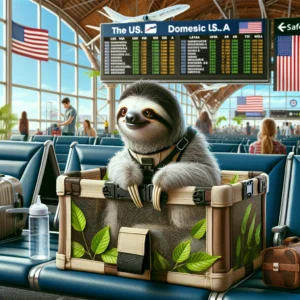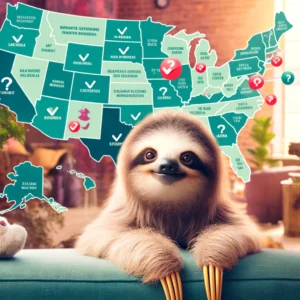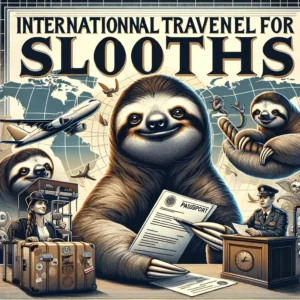Sloths have garnered popularity as exotic pets due to their gentle nature and unique appearance. However, before considering a sloth as a pet, it is crucial to understand the legal implications, dietary needs, and housing requirements. This article aims to provide a comprehensive overview of these aspects to help potential owners make informed decisions.
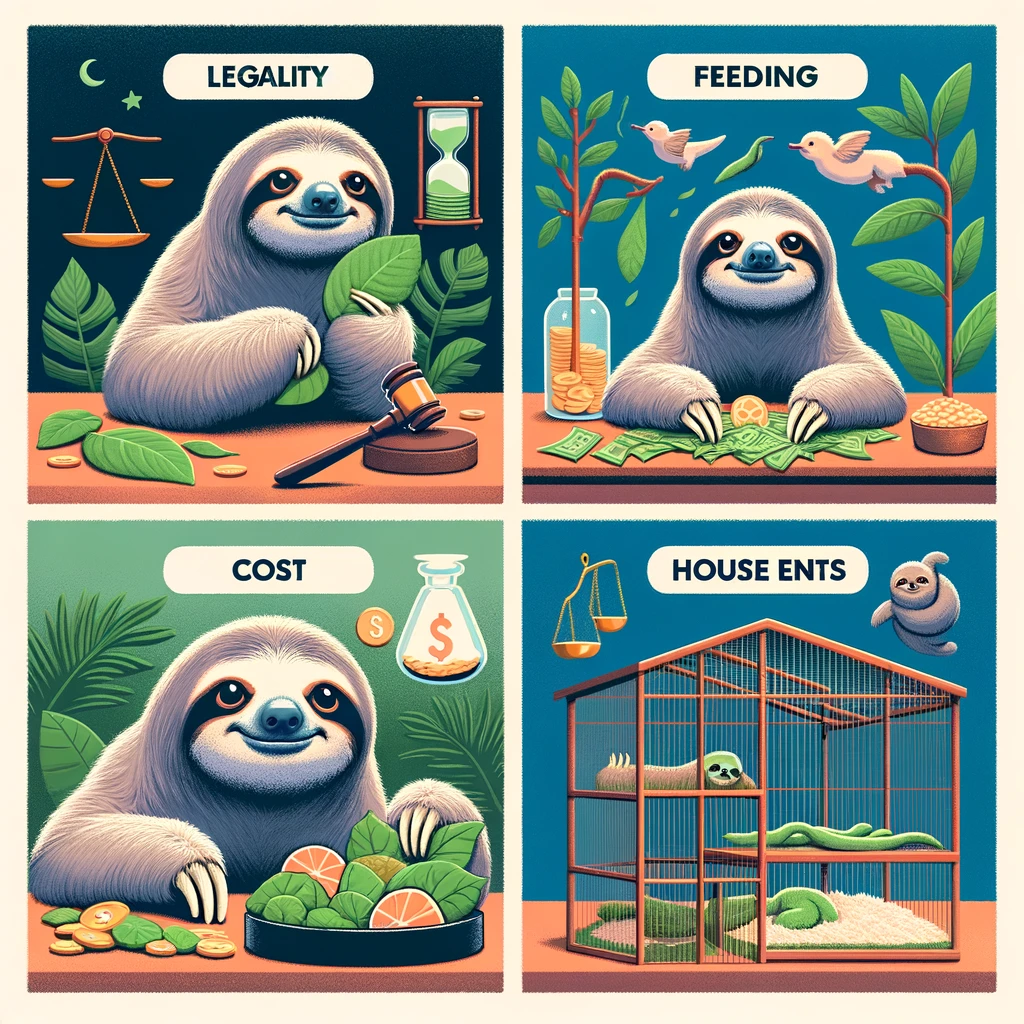
Legality of Owning a Pet Sloth
Before you consider bringing a sloth into your home, it’s imperative to research the legal restrictions and requirements in your country and state. The legality of owning a pet sloth varies significantly:
- United States: Laws differ by state. Some require permits, others have outright bans.
- Europe: Most countries have strict regulations or bans on exotic pets.
- Australia: Generally, it’s illegal to own a sloth as a pet.
Steps to Determine Legality:
- Consult Local Wildlife Authorities: They will provide the most accurate information regarding permits and restrictions.
- Research State and Federal Laws: Ensure your compliance with both sets of regulations.
- Consider Ethical Implications: Owning a sloth goes beyond legality; consider if you can meet its welfare needs.
Feeding Your Pet Sloth
Sloths are herbivores with specific dietary needs that must be met to ensure their health and longevity. A proper diet consists of:
- Leaves: The primary component. In the wild, sloths consume a variety of leaves, some of which may be hard to replicate in a home environment.
- Fruits and Vegetables: Can be offered in small quantities as a supplement to their leafy diet.
- Specialized Exotic Pet Food: Some brands offer formulations designed for sloths.
Important Feeding Tips:
- Variety is Key: Ensure a wide range of leaves and supplements to mimic their natural diet.
- Avoid Human Foods: Many common human foods can be harmful to sloths.
- Consult a Veterinarian: Regular check-ups with a vet experienced in exotic animals can help tailor the diet to your sloth’s needs.
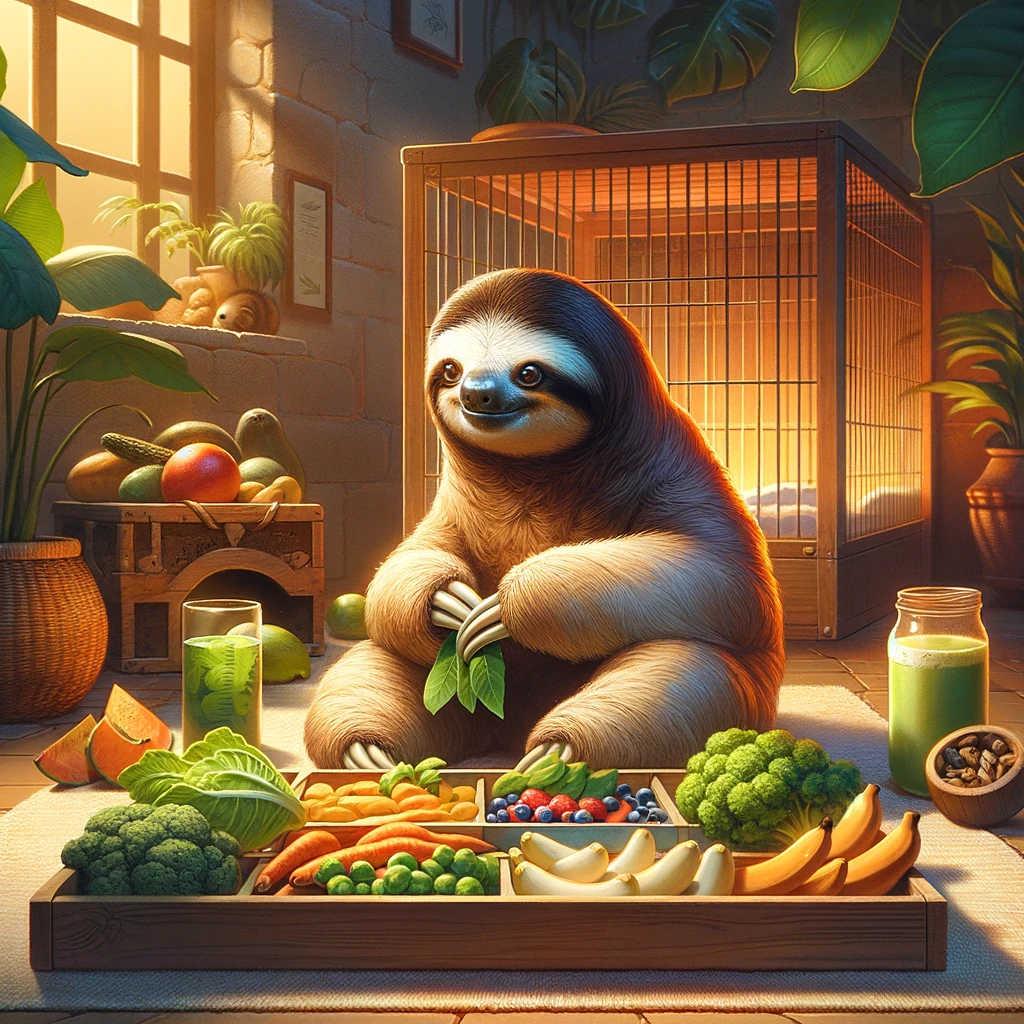
Initial Purchase Price
- Sloth Purchase: The price of a sloth itself can range from approximately $2,000 to $6,000 or more, depending on the rarity of the species and legal considerations in your region.
Housing and Environment
- Enclosure: Custom enclosures can cost upwards of $1,000 to $5,000, depending on size and complexity. Sloths require a large, vertical space to mimic their natural climbing habits.
- Climate Control: Costs for heating and humidifying the space can add to monthly utility bills, with the setup for such systems potentially adding a few hundred dollars.
Food and Dietary Needs
- Diet: Sloths eat a specialized diet that can include leaves, fruits, and vegetables, and sometimes supplements. This can cost $100 to $300 per month, depending on availability and specific dietary requirements.
Veterinary Care
- Routine Check-ups: Exotic animal vets can be more expensive than those for common pets. Regular health checks, vaccinations (if applicable), and any emergency treatments can lead to significant costs. An annual check-up might range from $100 to over $500, not including any treatments or emergencies.
Additional Costs
- Permits: Some states require permits to own exotic animals, which can have associated fees.
- Insurance: Finding insurance that covers exotic pets can be challenging and potentially expensive.
- Transportation: Specialized transport for vet visits or moving can add to the cost.
Total Cost of Ownership
- Initial Year: The first year of owning a sloth can easily cost between $3,000 to over $10,000, including the purchase price, enclosure setup, and initial veterinary care.
- Annual Costs: After the initial setup, owners can expect to spend $1,200 to $4,000 annually, largely depending on food, healthcare, and any additional unforeseen expenses.
Owning a sloth is a significant financial commitment, not to mention the time and effort required to care for such an exotic pet properly. It’s essential to consider all these factors and ensure you have the resources and commitment needed to provide a safe, healthy, and happy life for your sloth.
Below is a summary of the costs associated with owning a pet sloth, presented in a table format for clarity:
| Cost Category | Initial Costs | Annual/Ongoing Costs |
|---|---|---|
| Sloth Purchase | $2,000 – $6,000 | N/A |
| Enclosure & Environment | $1,000 – $5,000 | Variable (maintenance) |
| Climate Control Setup | $100 – $500+ | Increased utility bills |
| Food & Dietary Needs | Variable | $100 – $300/month |
| Veterinary Care | $100 – $500+ (initial) | $100 – $500+ (annual) |
| Permits (if required) | Variable | N/A |
| Insurance | Variable | Variable |
| Transportation | Variable | Variable |
| Total Initial Year | $3,000 – $10,000+ | |
| Annual Costs | $1,200 – $4,000+ |
Please note that these costs are approximate and can vary widely depending on specific circumstances, including the sloth’s health, the local cost of living, availability of specialized veterinary care, and the specific needs and behaviors of the sloth.
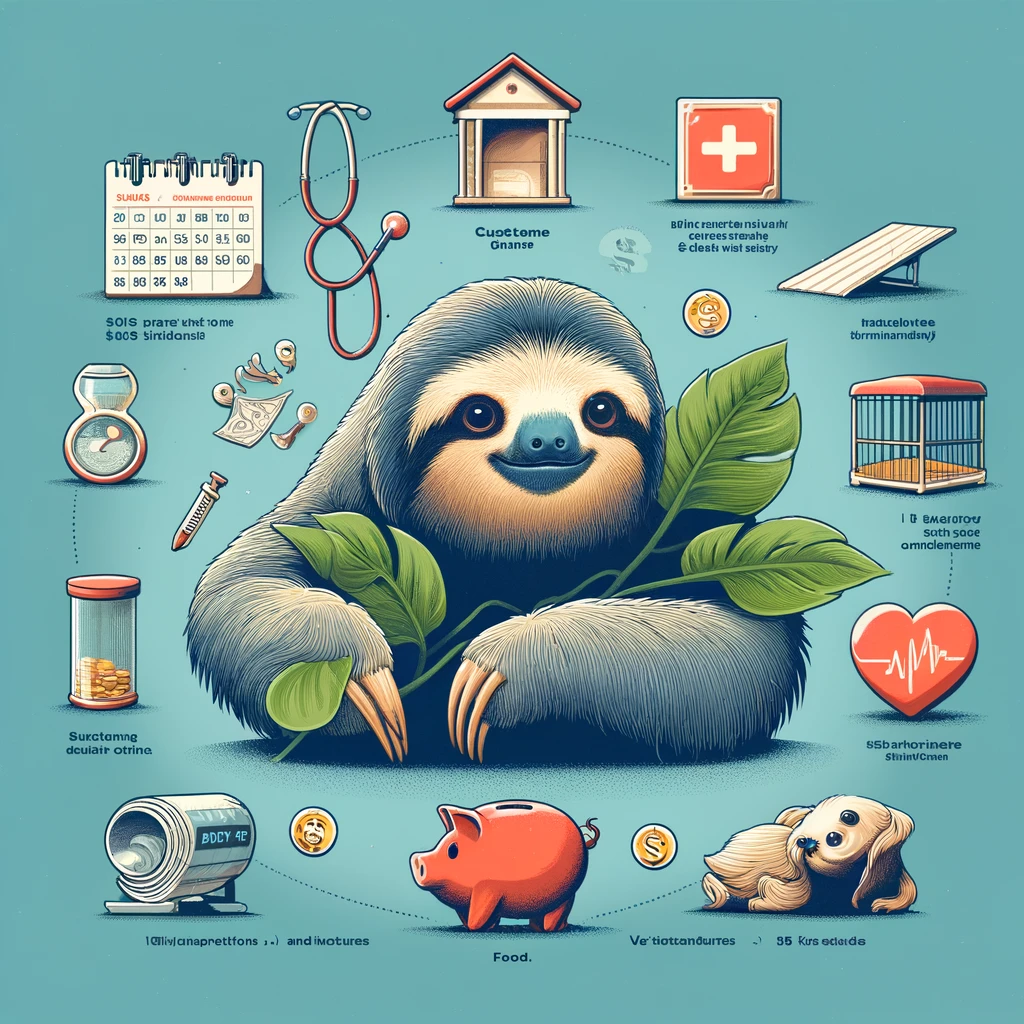
Housing Requirements for a Pet Sloth
Space and Structure
Sloths need ample vertical space to climb and exercise. A large, tall enclosure that allows the sloth to move freely and mimic its natural climbing behavior is essential. The enclosure should be sturdy and secure, with branches, ropes, and platforms at various heights.
Temperature and Humidity
The enclosure must maintain a warm and humid environment similar to a rainforest. Ideal temperature ranges are between 75°F to 80°F (24°C to 27°C) during the day, with a slight drop at night. Humidity levels should be kept at 70% to 90% to mimic their natural habitat and support their health.
Lighting
Proper lighting is crucial for maintaining a sloth’s circadian rhythm and overall well-being. Natural light is best, but if this isn’t possible, full-spectrum UV lighting should be provided to simulate daylight. This is especially important for indoor enclosures.
Safety and Comfort
Safety is a paramount concern. The enclosure should be free of sharp edges or small objects that a sloth could swallow. Non-toxic plants can add to the enclosure’s natural feel but ensure they are safe for sloths. Soft landing areas and hammocks can provide comfortable resting places.
Cleanliness
Maintaining cleanliness is essential to prevent the growth of bacteria and fungi. Regular cleaning of the enclosure, food dishes, and water sources is necessary. The use of easy-to-clean materials can help maintain hygiene standards.
Table Summary
| Requirement | Details |
|---|---|
| Space and Structure | Large, tall enclosure with branches, ropes, and platforms. |
| Temperature | 75°F to 80°F (24°C to 27°C) during the day; slightly cooler at night. |
| Humidity | 70% to 90%, to mimic rainforest conditions. |
| Lighting | Natural or full-spectrum UV lighting to simulate daylight. |
| Safety and Comfort | Free from hazards; include non-toxic plants and soft resting areas. |
| Cleanliness | Regular cleaning of enclosure and accessories; use of easy-to-clean materials recommended. |
Creating a suitable living environment for a sloth takes careful planning and consideration. By meeting these housing requirements, you can ensure your sloth lives a happy, healthy life that is as close to its natural habitat as possible. Remember, owning a sloth is a significant commitment and responsibility, requiring dedication to their unique needs.

Conclusion
Owning a pet sloth is a significant commitment that requires thorough research and preparation. Understanding the legalities, dietary needs, and housing requirements is crucial for the wellbeing of these unique creatures. By ensuring you can provide a suitable environment and care, you contribute to the responsible ownership of exotic pets.
FAQs
1. Is it legal to own a sloth as a pet in my state?
The legality of owning a sloth varies by state and country. Some areas may allow it with specific permits, while others have outright bans. Always check with your local wildlife department or conservation agency for the most up-to-date information.
2. What do pet sloths eat?
Sloths are primarily herbivores, with a diet in captivity that can include a variety of leaves, fruits, and vegetables. Specialized sloth diets may also be recommended, which can include commercially available exotic pet foods that meet their nutritional needs.
3. How much does it cost to buy a pet sloth?
The initial purchase price for a sloth can range from $2,000 to $6,000 or more, depending on the species and the legal regulations in your area.
4. What are the ongoing costs of owning a sloth?
Annual costs can include food, housing maintenance, and veterinary care, amounting to $1,200 to $4,000 or more. This does not include the initial setup costs for creating a suitable living environment.
5. What kind of environment does a sloth need?
A sloth requires a large and tall enclosure that mimics its natural habitat, with ample space for climbing. The environment should be warm and humid, with temperatures ranging from 75°F to 80°F and humidity levels between 70% to 90%.
6. How do I set up a sloth’s living environment?
The enclosure should have sturdy branches, ropes, and platforms for climbing, as well as soft landing areas. It should be safe from hazards, have controlled temperature and humidity, and be equipped with appropriate lighting.
7. Are sloths easy to care for?
While sloths may seem like low-maintenance pets due to their slow-moving nature, they have specific and complex care requirements. They need a carefully controlled diet, environment, and regular veterinary check-ups.
8. Can sloths be potty trained?
Sloths have a unique metabolism and defecate only once a week. While they can be encouraged to use a specific spot, true potty training as understood with other pets is not typical.
9. Do sloths get along with other pets?
Sloths are solitary animals and may not interact much with other pets. Additionally, the presence of more active or predatory animals could stress the sloth.
10. How long do sloths live?
In captivity, sloths can live for 20 to 30 years with proper care, making them a long-term commitment as a pet.

Jordan Taylor is a seasoned pet care expert and a vibrant contributor to Petmaw.com. With over a decade of experience in veterinary science, Jordan brings a wealth of knowledge and a deep passion for animals to every article. After earning a degree in Veterinary Medicine from the University of Alaska Anchorage, Jordan spent several years working in a busy veterinary clinic, where they honed their skills in pet nutrition, behavior, and wellness.
Jordan’s love for animals isn’t just professional; it’s a fundamental part of their life. Home is shared with three rescue Sloth, two cats, and a small flock of backyard chickens, each with their own rescue story and special place in Jordan’s heart. This personal connection to animals shines through in Jordan’s writing, making their advice not only expert but also empathetic and practical for pet owners.
At Petmaw.com, Jordan is dedicated to providing pet owners with the latest research, trends, and tips in pet care, from innovative feeding strategies to understanding the subtle signs of pet health issues. Whether you’re a seasoned pet owner or new to the pet parenting world, Jordan’s insights aim to enhance the well-being of pets and deepen the human-animal bond.
In their spare time, Jordan is an avid hiker, often found exploring the trails with their dogs. They also volunteer at local animal shelters, offering their expertise and helping animals in need find forever homes. Jordan’s commitment to animal welfare and passion for sharing knowledge makes them a cherished member of the Petmaw.com family and a trusted guide for our readers.


